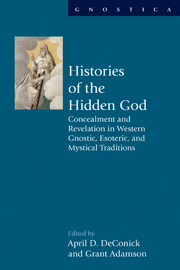 Histories of the Hidden God
Histories of the Hidden God from Part III - Revelations of the Hidden God
Few academic studies have acknowledged esotericism and Gnosticism in African American religion. The Nation of Islam, under the leadership of the Honorable Elijah Muhammad offers a glimpse into the meaning and function of both notions in the context of African American religious culture. Drawing upon esoteric sources that included theosophy, freemasonry, and nascent ufology, the Nation of Islam fashioned a unique theology and mythology that allowed it to engage a world in which its members felt marginalized and violated symbolically and actually. As a form of epistemology, this essay argues, esotericism and Gnosticism gave the Nation of Islam a sense of control over the meaning of “black” bodies against a historical condition in which black bodies had been constructed by discursive and social practices that posited them as inferior. Furthermore, that knowledge and God in the Nation of Islam were secret and hidden functioned to give them hope that their value and agency would eventually be realized, not in a heavenly realm, but rather in a millennial material existence on earth. Only Nation of Islam adepts had access to such “knowledge” of the universe that was veiled in the symbols of freemasonry and revealed by “UFOs.”
ESOTERICISM AND GNOSTICISM IN THE HISTORY OF THE NATION OF ISLAM
The very origin and sources of the Nation of Islam bespeak the esotericism and Gnosticism that make it distinct among African American religious traditions and, as such, religious groups in North America. In exposing this history, I would like to draw close attention to freemasonry, theosophy, and the Jehovah's Witnesses since they all play pivotal roles in the development of esotericism and Gnosticism in the Nation of Islam.
To save this book to your Kindle, first ensure [email protected] is added to your Approved Personal Document E-mail List under your Personal Document Settings on the Manage Your Content and Devices page of your Amazon account. Then enter the ‘name’ part of your Kindle email address below. Find out more about saving to your Kindle.
Note you can select to save to either the @free.kindle.com or @kindle.com variations. ‘@free.kindle.com’ emails are free but can only be saved to your device when it is connected to wi-fi. ‘@kindle.com’ emails can be delivered even when you are not connected to wi-fi, but note that service fees apply.
Find out more about the Kindle Personal Document Service.
To save content items to your account, please confirm that you agree to abide by our usage policies. If this is the first time you use this feature, you will be asked to authorise Cambridge Core to connect with your account. Find out more about saving content to Dropbox.
To save content items to your account, please confirm that you agree to abide by our usage policies. If this is the first time you use this feature, you will be asked to authorise Cambridge Core to connect with your account. Find out more about saving content to Google Drive.